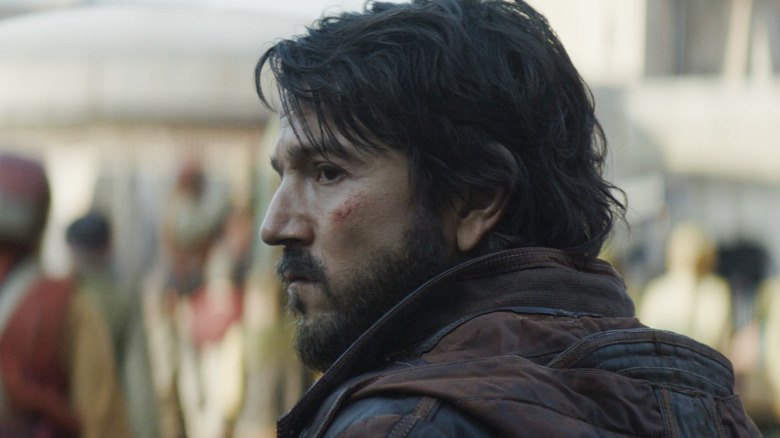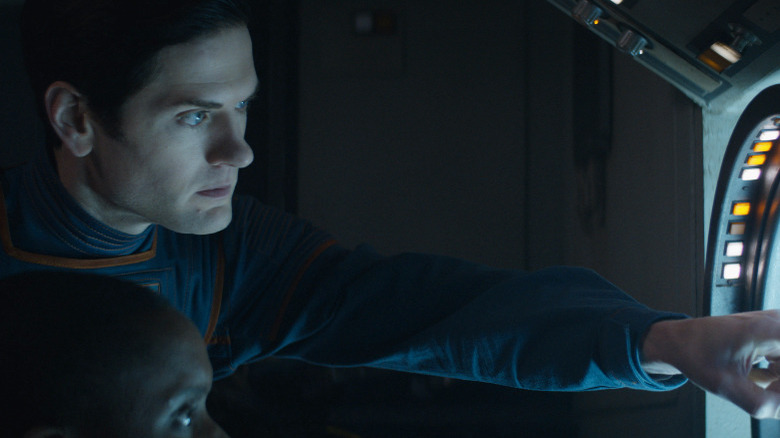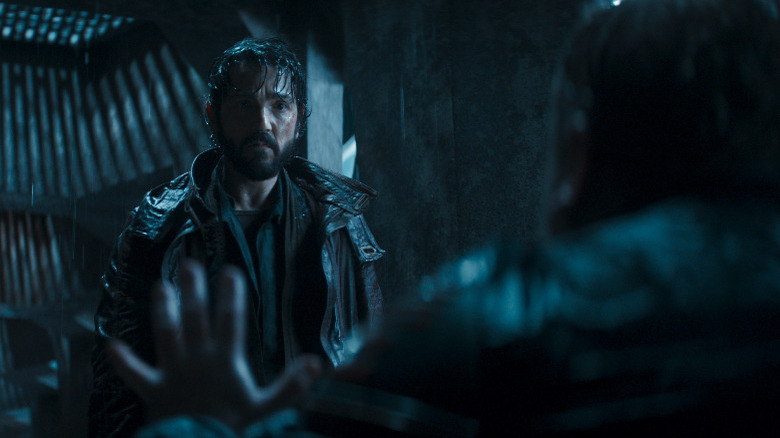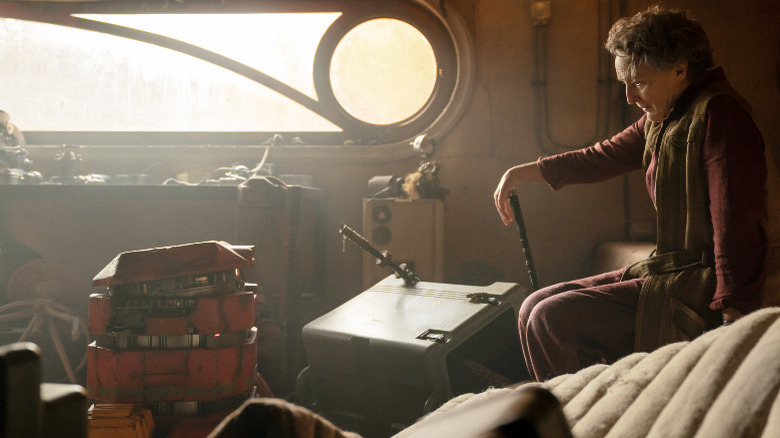How Andor Compares To The Other Work Of Creator Tony Gilroy
This post contains minor spoilers for the first three episodes of "Andor."
Tony Gilroy was far from an obvious pick to work on a "Star Wars" project, prior to him helping with the reshoots on 2016's "Rogue One: A Star Wars Story." The multi-talent got his start writing adult thrillers like "Dolores Claiborne" in the 1990s, folllowed by the first three "Bourne" movies in the aughts. Similarly, Gilroy's output as a writer/director ("Michael Clayton," "Duplicity," "The Bourne Legacy") has been chiefly concerned with the subterfuge used by powerful individuals, companies, and covert agencies to do their dirty deeds away from prying eyes. That's not exactly the type of mythical, spectacle-heavy storytelling commonly associated with "Star Wars."
However, it's his unique approach that has allowed Gilroy to come in and take "Star Wars" to places it's never gone before with his Disney+ series "Andor," a show that picks up with Diego Luna's Cassian Andor five years before his selfless actions in "Rogue One." As its creator, head writer, and executive producer, Gilroy was able to shape the project from the ground-up in ways he simply couldn't the last time he visited a galaxy far, far away. It's no wonder, then, "Andor" shares a number of distinct qualities with his other work, and is all the better for it.
No hand-holding, just world-building
"Andor" wastes no time before pulling you knee-deep into Cassian's illicit dealings and shady activities. The show doesn't hesitate to throw jargon and terminology specific to its setting at you, trusting you to keep up with its world-building rather than holding your hand. It's a trait it shares with Gilroy's film work, most of which tosses viewers right into the water rather than going out of its to explain how, say, the law firm in "Michael Clayton" operates or whose job is it to do what in the CIA in the "Bourne" movies.
There's even a fair amount of visual overlap between Gilroy's "Star Wars" series and his films. The first three episodes of "Andor" feature multiple scenes of low-ranking Imperial employees sitting in chairs at their desks trying to track Cassian, much like the CIA agents tasked with locating Jason Bourne. In both cases, the mix of administrative lingo and bureaucratic imagery makes these backdrops feel lived-in and fleshed out. It's clear these spaces have their own rules and ways of doing things that have been in place since long before the stories being told began.
Back-door dealings and secrets are also recurring elements of Gilroy's writing outside of "Star Wars," be they confidential relationships between politicians and the press (see 2009's "State of Play," which he co-wrote) or the lies families and friends tell to protect the ones they care about the most (a motif that goes back to "Dolores Claiborne"). Such is the case with "Andor," which depicts Cassian as someone who's long kept his not-so-strictly legal business off the Empire's radar. Not to mention, those closest to him are sitting on some potentially explosive details concerning his past and where he comes from.
You can't outrun your past
You know you're watching a proper Tony Gilroy joint when your lead character has a dubious past they would gladly leave behind them. As with Michael Clayton, Jason Bourne, or even Aaron Cross from "The Bourne Legacy," Cassian is, at best, a cynical, suspect figure when "Andor" begins. He's not looking for trouble but he's willing to kill others if it means protecting his neck. He's even got family-related problems (Cassian is searching for his sister, from whom he's long been separated), much like Michael is reeling from his failed attempt to start up a restaurant with his brother.
This is where a key trait of Gilroy's work — non-linear storytelling — comes into play. "Michael Clayton" opens with a flash-forward in which Michael nearly dies, only to wind the clock back four days to reveal the incidents leading up to this shocking turn of events. Gilroy's crime-comedy "Duplicity" is particularly sneaky in the way it shifts back and forth in time, divulging surprising motivations for characters and re-framing earlier scenes in a new light. Even Jason Bourne's sudden flashes of lost memories in the "Bourne" films are a form of non-linear narration.
"Andor" does something similar in its first three episodes, cutting back and forth between Cassian's childhood on Kenari and his present-day life on Ferrix. The show takes its time dispensing these details about Cassian's past, effectively drawing out the mystery of how it led him to the life he has at the start of the series. This not only enriches him as a character, it also lends greater clarity to the vague allusions to his backstory in "Rogue One" and makes for an engrossing narrative device.
Adult content? In my Star Wars?
"Rogue One" really leans into the "Wars" part of "Star Wars," delivering a grittier and darker vision of the Rebel Alliance and its battle with the Galactic Empire than any movie before it. At the same time, there are some lighter-hearted scenes and moments of fan service that feel out of place with the rest of the film tonally. That's not the case with "Andor," a show that's far from overly self-serious yet strikes a more consistently grounded, grown-up vibe.
Of course, "Andor" doesn't venture into, say, "House of the Dragon" territory, even now that Disney is allowing films and series with full-blown adult content to stream on Disney+. But it is the closest a live-action "Star Wars" show has come to feeling like a crime drama targeted at older viewers rather than families. The series has a fairly overt political subtext and a gray sense of morality it shares with Gilroy's other work, criticizing the Empire for its fascist practices while siding with the Rebels and the working-class. Yet, even then, it's not afraid to depict its heroes doing questionable if not outright bad things, in the same way the "Bourne" films ask us to side with ex-assassins or "Michael Clayton" centers on an unscrupulous "fixer."
There are even brief moments when "Andor" embraces the same type of mature storytelling as those films, like when it touches on a casual physical relationship between two unmarried consenting adults or lets a character drop the S-bomb in the heat of combat (the scandal!). Combined with its scuzzy production design and unvarnished visuals (most of which are rich with textures), the show does what Gilroy's other projects do best: Make its characters and their heightened circumstances feel real.
New episodes of "Andor" premiere Wednesdays on Disney+.



